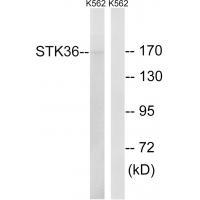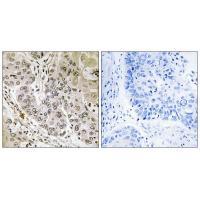

| WB | 咨询技术 | Human,Mouse,Rat |
| IF | 咨询技术 | Human,Mouse,Rat |
| IHC | 1/50-1/100 | Human,Mouse,Rat |
| ICC | 技术咨询 | Human,Mouse,Rat |
| FCM | 咨询技术 | Human,Mouse,Rat |
| Elisa | 咨询技术 | Human,Mouse,Rat |
| Aliases | Serine/threonine-protein kinase 36 EC 2.7.11.1; Fused homolog STK36; |
| Entrez GeneID | 27148; |
| WB Predicted band size | 170kDa |
| Host/Isotype | Rabbit IgG |
| Antibody Type | Primary antibody |
| Storage | Store at 4°C short term. Aliquot and store at -20°C long term. Avoid freeze/thaw cycles. |
| Species Reactivity | Human |
| Immunogen | Synthesized peptide derived from internal of human STK36. |
| Formulation | Purified antibody in PBS with 0.05% sodium azide. |
+ +
以下是关于STK36抗体的3篇参考文献及其摘要概述:
1. **文献名称**:*"STK36 interacts with Gli2 and negatively regulates Hedgehog signaling in medulloblastoma"*
**作者**:Han Y. et al.
**摘要**:该研究通过免疫共沉淀和Western blot技术,发现STK36与Gli2蛋白相互作用,并利用特异性抗体证实其在髓母细胞瘤中通过调控Hedgehog通路抑制肿瘤生长。
2. **文献名称**:*"Expression and functional analysis of STK36 in glioblastoma multiforme"*
**作者**:Chen L. et al.
**摘要**:使用STK36抗体进行免疫组化分析,发现其在胶质母细胞瘤中高表达,并通过体外实验证明敲低STK36可抑制肿瘤细胞增殖和迁移,提示其作为治疗靶点的潜力。
3. **文献名称**:*"STK36 regulates primary cilia stability and Wnt signaling in colorectal cancer"*
**作者**:Wang Q. et al.
**摘要**:通过免疫荧光和Western blot结合STK36抗体,研究发现STK36通过维持纤毛结构稳定性调控Wnt信号通路,影响结直肠癌细胞的侵袭和转移能力。
4. **文献名称**:*"The role of STK36 in embryonic development and tissue homeostasis"*
**作者**:Smith R. et al.
**摘要**:利用STK36特异性抗体进行胚胎组织染色,揭示其在脊椎动物发育过程中调控细胞极性和分化的功能,尤其在神经管闭合中起关键作用。
STK36. also known as FU (Fused homolog), is a serine/threonine kinase that plays a critical role in the Hedgehog (Hh) signaling pathway, a key regulator of embryonic development and tissue homeostasis. This kinase interacts with components of the Hh pathway, particularly Gli transcription factors, to modulate their activity and stability. STK36 is involved in ciliary function and is essential for proper transduction of Hh signals, which influence cell proliferation, differentiation, and patterning. Dysregulation of STK36 has been implicated in developmental disorders and cancers, including medulloblastoma and basal cell carcinoma.
Antibodies targeting STK36 are valuable tools for studying its expression, localization, and molecular interactions. They are commonly used in techniques such as Western blotting, immunofluorescence, and immunohistochemistry to investigate STK36's role in Hh signaling or its dysregulation in disease models. These antibodies often recognize specific epitopes, such as the kinase domain or C-terminal regions, enabling researchers to distinguish STK36 from related kinases. Validation of specificity, through knockout controls or siRNA knockdown, is critical for reliable results. STK36 antibodies also aid in exploring its potential as a therapeutic target, particularly in cancers driven by aberrant Hh pathway activation. Their application extends to developmental biology studies, where spatial-temporal expression patterns of STK36 are analyzed in model organisms.
×